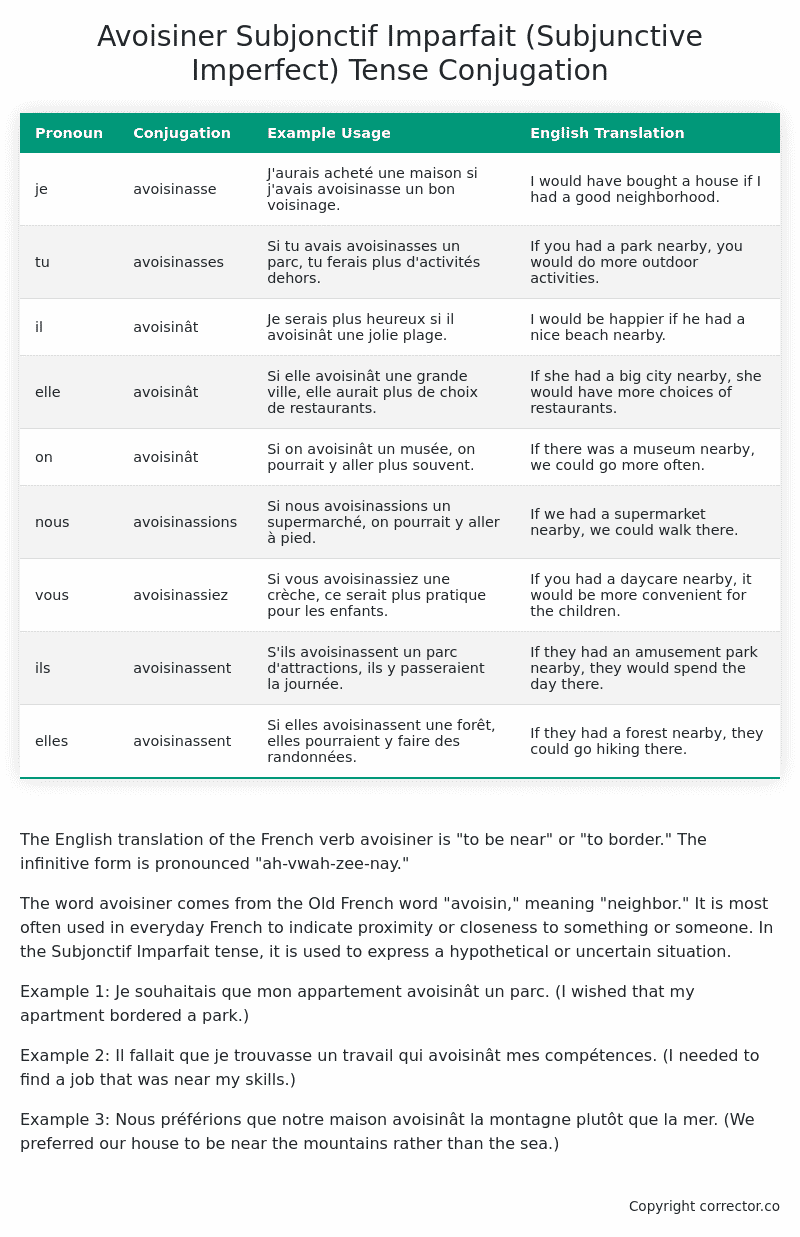Subjonctif Imparfait (Subjunctive Imperfect) Tense Conjugation of the French Verb avoisiner
Introduction to the verb avoisiner
The English translation of the French verb avoisiner is “to be near” or “to border.” The infinitive form is pronounced “ah-vwah-zee-nay.”
The word avoisiner comes from the Old French word “avoisin,” meaning “neighbor.” It is most often used in everyday French to indicate proximity or closeness to something or someone. In the Subjonctif Imparfait tense, it is used to express a hypothetical or uncertain situation.
Example 1: Je souhaitais que mon appartement avoisinât un parc. (I wished that my apartment bordered a park.)
Example 2: Il fallait que je trouvasse un travail qui avoisinât mes compétences. (I needed to find a job that was near my skills.)
Example 3: Nous préférions que notre maison avoisinât la montagne plutôt que la mer. (We preferred our house to be near the mountains rather than the sea.)
Table of the Subjonctif Imparfait (Subjunctive Imperfect) Tense Conjugation of avoisiner
| Pronoun | Conjugation | Example Usage | English Translation |
|---|---|---|---|
| je | avoisinasse | J’aurais acheté une maison si j’avais avoisinasse un bon voisinage. | I would have bought a house if I had a good neighborhood. |
| tu | avoisinasses | Si tu avais avoisinasses un parc, tu ferais plus d’activités dehors. | If you had a park nearby, you would do more outdoor activities. |
| il | avoisinât | Je serais plus heureux si il avoisinât une jolie plage. | I would be happier if he had a nice beach nearby. |
| elle | avoisinât | Si elle avoisinât une grande ville, elle aurait plus de choix de restaurants. | If she had a big city nearby, she would have more choices of restaurants. |
| on | avoisinât | Si on avoisinât un musée, on pourrait y aller plus souvent. | If there was a museum nearby, we could go more often. |
| nous | avoisinassions | Si nous avoisinassions un supermarché, on pourrait y aller à pied. | If we had a supermarket nearby, we could walk there. |
| vous | avoisinassiez | Si vous avoisinassiez une crèche, ce serait plus pratique pour les enfants. | If you had a daycare nearby, it would be more convenient for the children. |
| ils | avoisinassent | S’ils avoisinassent un parc d’attractions, ils y passeraient la journée. | If they had an amusement park nearby, they would spend the day there. |
| elles | avoisinassent | Si elles avoisinassent une forêt, elles pourraient y faire des randonnées. | If they had a forest nearby, they could go hiking there. |
Other Conjugations for Avoisiner.
Le Present (Present Tense) Conjugation of the French Verb avoisiner
Imparfait (Imperfect) Tense Conjugation of the French Verb avoisiner
Passé Simple (Simple Past) Tense Conjugation of the French Verb avoisiner
Passé Composé (Present Perfect) Tense Conjugation of the French Verb avoisiner
Futur Simple (Simple Future) Tense Conjugation of the French Verb avoisiner
Futur Proche (Near Future) Tense Conjugation of the French Verb avoisiner
Plus-que-parfait (Pluperfect) Tense Conjugation of the French Verb avoisiner
Passé Antérieur (Past Anterior) Tense Conjugation of the French Verb avoisiner
Futur Antérieur (Future Anterior) Tense Conjugation of the French Verb avoisiner
Subjonctif Présent (Subjunctive Present) Tense Conjugation of the French Verb avoisiner
Subjonctif Passé (Subjunctive Past) Tense Conjugation of the French Verb avoisiner
Subjonctif Imparfait (Subjunctive Imperfect) Tense Conjugation of the French Verb avoisiner (this article)
Subjonctif Plus-que-parfait (Subjunctive Pluperfect) Tense Conjugation of the French Verb avoisiner
Conditionnel Présent (Conditional Present) Tense Conjugation of the French Verb avoisiner
Conditionnel Passé (Conditional Past) Tense Conjugation of the French Verb avoisiner
L’impératif Présent (Imperative Present) Tense Conjugation of the French Verb avoisiner
L’infinitif Présent (Infinitive Present) Tense Conjugation of the French Verb avoisiner
Struggling with French verbs or the language in general? Why not use our free French Grammar Checker – no registration required!
Get a FREE Download Study Sheet of this Conjugation 🔥
Simply right click the image below, click “save image” and get your free reference for the avoisiner Subjonctif Imparfait tense conjugation!

Avoisiner – About the French Subjonctif Imparfait (Subjunctive Imperfect) Tense
Formation
Common Everyday Usage Patterns
Interactions with Other Tenses
Subjonctif Présent
Indicatif Passé Composé
Conditional
Conditional Perfect
Summary
I hope you enjoyed this article on the verb avoisiner. Still in a learning mood? Check out another TOTALLY random French verb conjugation!


